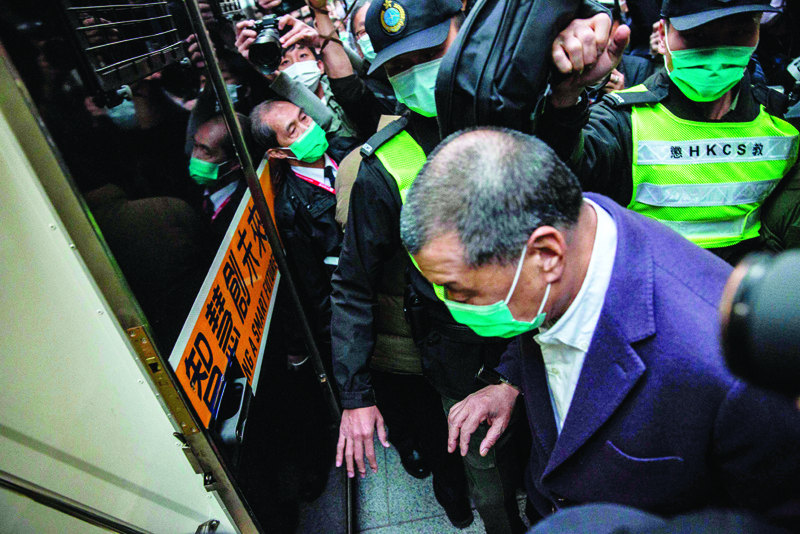
HONG KONG: Hong Kong pro-democracy media tycoon Jimmy Lai was ordered back to jail yesterday as the city's highest court granted prosecutors an appeal against his bail. Lai, a vocal Beijing critic, is one of the highest-profile figures charged under a sweeping security law that China imposed on the financial hub in late June in a bid to stamp out dissent.
The 73-year-old served 20 days in custody before being granted bail last Wednesday on stringent conditions including a HK$10 million (US$1.3 million) bond and a surrender of all travel documents. He was placed under house arrest and banned from speaking publicly, including on Twitter. But the Court of Final Appeal yesterday granted the prosecution leave to appeal the bail decision, after they said a lower court judge may "have erred in his construction or application" of Article 42 of the new legislation.
That article states that bail should not be granted unless the judge sees sufficient grounds to believe the defendant will not commit the alleged offence again. "We have held that it is reasonably arguable that the Judge's decision was erroneous and that his order admitting the respondent to bail was invalid," a determination handed down by the appeal committee of the Court of Final Appeal read.
It also granted the prosecution's application for Lai to be held in custody pending the appeal, to be heard on Feb 1. Lai is accused of colluding with foreign countries by calling on overseas governments to sanction Hong Kong and China in response to an ongoing crackdown on pro-democracy activism in the city. More than 1,000 of his tweets and a number of media interviews he gave have been examined by the prosecution.
Lai was the first defendant charged under the security law to be granted bail, but prosecutors rushed to the top court to apply for an appeal. Prosecutor Anthony Chau argued that bail should not be considered in national security cases and likened the seriousness of national security offences to murder and treason. "Normally in this kind of grave offence, the court cannot grant bail," Chau said in court.
China's top party mouthpiece People's Daily had criticized the bail decision and threatened that Lai could be extradited to mainland China for trial. Lai also faces separate charges of fraud and joining unlawful assemblies during the massive, often violent, pro-democracy protests of 2019. On Tuesday, the mogul resigned as chairman and executive director of Next Digital, which owns the Apple Daily newspaper he founded three decades ago.
Lai tendered his resignation "in order to spend more time dealing with his personal affairs", Bloomberg News reported citing a statement from the media group. China's authoritarian leaders guaranteed Hong Kong would maintain key freedoms and autonomy after its 1997 handover by Britain, under a model dubbed "One Country, Two Systems".
But a historic retreat from that promise is under way, in response to recent years' unrest. Since the national security law's imposition, Beijing increasingly calls the shots. Voicing certain opinions can now carry up to a lifetime prison sentence. - AFP










